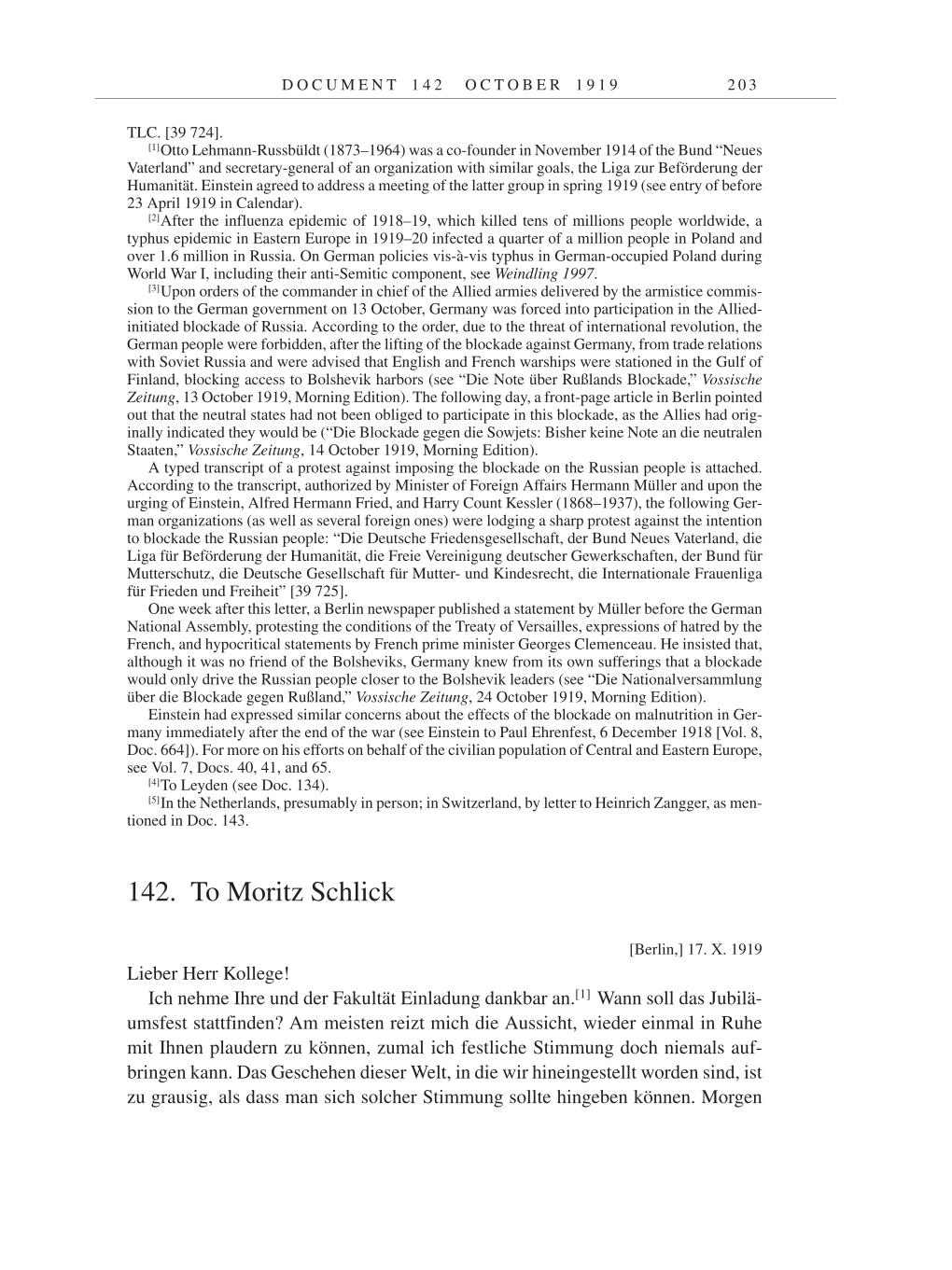D O C U M E N T 1 4 2 O C T O B E R 1 9 1 9 2 0 3
TLC. [39 724].
[1]Otto Lehmann-Russbüldt (1873–1964) was a co-founder in November 1914 of the Bund “Neues
Vaterland” and secretary-general of an organization with similar goals, the Liga zur Beförderung der
Humanität. Einstein agreed to address a meeting of the latter group in spring 1919 (see entry of before
23 April 1919 in Calendar).
[2]After the influenza epidemic of 1918–19, which killed tens of millions people worldwide, a
typhus epidemic in Eastern Europe in 1919–20 infected a quarter of a million people in Poland and
over 1.6 million in Russia. On German policies vis-à-vis typhus in German-occupied Poland during
World War I, including their anti-Semitic component, see Weindling 1997.
[3]Upon orders of the commander in chief of the Allied armies delivered by the armistice commis-
sion to the German government on 13 October, Germany was forced into participation in the Allied-
initiated blockade of Russia. According to the order, due to the threat of international revolution, the
German people were forbidden, after the lifting of the blockade against Germany, from trade relations
with Soviet Russia and were advised that English and French warships were stationed in the Gulf of
Finland, blocking access to Bolshevik harbors (see “Die Note über Rußlands Blockade,” Vossische
Zeitung, 13 October 1919, Morning Edition). The following day, a front-page article in Berlin pointed
out that the neutral states had not been obliged to participate in this blockade, as the Allies had orig-
inally indicated they would be (“Die Blockade gegen die Sowjets: Bisher keine Note an die neutralen
Staaten,” Vossische Zeitung, 14 October 1919, Morning Edition).
A typed transcript of a protest against imposing the blockade on the Russian people is attached.
According to the transcript, authorized by Minister of Foreign Affairs Hermann Müller and upon the
urging of Einstein, Alfred Hermann Fried, and Harry Count Kessler (1868–1937), the following Ger-
man organizations (as well as several foreign ones) were lodging a sharp protest against the intention
to blockade the Russian people: “Die Deutsche Friedensgesellschaft, der Bund Neues Vaterland, die
Liga für Beförderung der Humanität, die Freie Vereinigung deutscher Gewerkschaften, der Bund für
Mutterschutz, die Deutsche Gesellschaft für Mutter- und Kindesrecht, die Internationale Frauenliga
für Frieden und Freiheit” [39 725].
One week after this letter, a Berlin newspaper published a statement by Müller before the German
National Assembly, protesting the conditions of the Treaty of Versailles, expressions of hatred by the
French, and hypocritical statements by French prime minister Georges Clemenceau. He insisted that,
although it was no friend of the Bolsheviks, Germany knew from its own sufferings that a blockade
would only drive the Russian people closer to the Bolshevik leaders (see “Die Nationalversammlung
über die Blockade gegen Rußland,” Vossische Zeitung, 24 October 1919, Morning Edition).
Einstein had expressed similar concerns about the effects of the blockade on malnutrition in Ger-
many immediately after the end of the war (see Einstein to Paul Ehrenfest, 6 December 1918 [Vol. 8,
Doc. 664]). For more on his efforts on behalf of the civilian population of Central and Eastern Europe,
see Vol. 7, Docs. 40, 41, and 65.
[4]To Leyden (see Doc. 134).
[5]In the Netherlands, presumably in person; in Switzerland, by letter to Heinrich Zangger, as men-
tioned in Doc. 143.
142. To Moritz Schlick
[Berlin,] 17. X. 1919
Lieber Herr Kollege!
Ich nehme Ihre und der Fakultät Einladung dankbar
an.[1]
Wann soll das Jubilä-
umsfest stattfinden? Am meisten reizt mich die Aussicht, wieder einmal in Ruhe
mit Ihnen plaudern zu können, zumal ich festliche Stimmung doch niemals auf-
bringen kann. Das Geschehen dieser Welt, in die wir hineingestellt worden sind, ist
zu grausig, als dass man sich solcher Stimmung sollte hingeben können. Morgen
